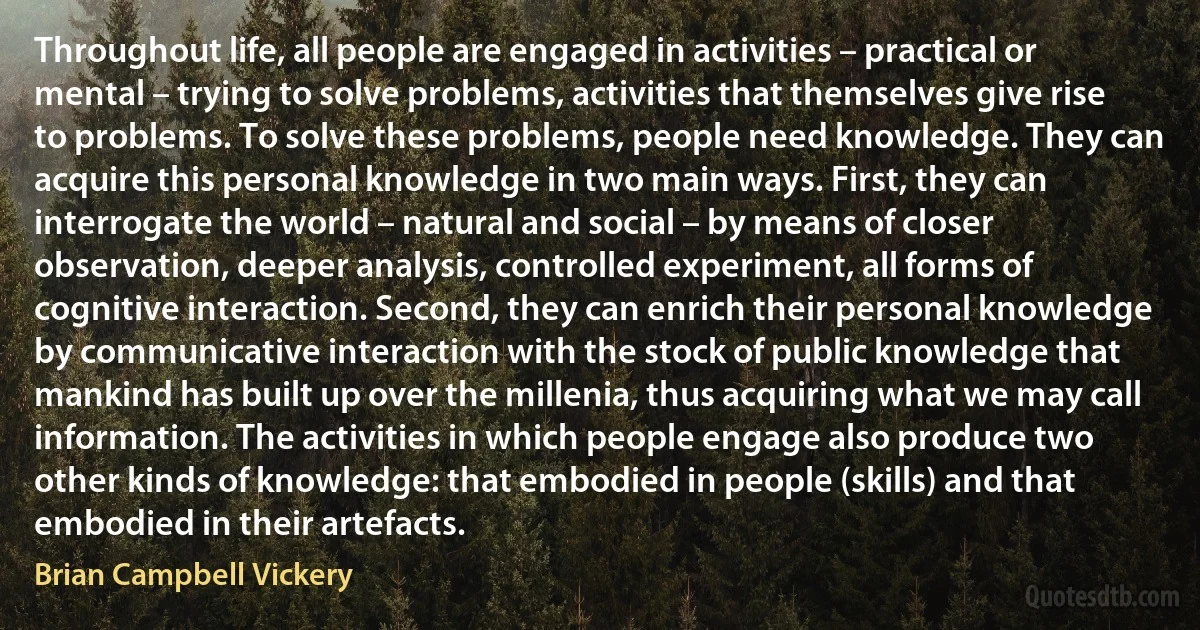
Throughout life, all people are engaged in activities – practical or mental – trying to solve problems, activities that themselves give rise to problems. To solve these problems, people need knowledge. They can acquire this personal knowledge in two main ways. First, they can interrogate the world – natural and social – by means of closer observation, deeper analysis, controlled experiment, all forms of cognitive interaction. Second, they can enrich their personal knowledge by communicative interaction with the stock of public knowledge that mankind has built up over the millenia, thus acquiring what we may call information. The activities in which people engage also produce two other kinds of knowledge: that embodied in people (skills) and that embodied in their artefacts.
Brian Campbell VickeryRelated topics
acquiring built call closer cognitive control experiment interaction interrogate knowledge life natural need people produce public rise second thus trying world means waysRelated quotes
Of what use is it to please the herd? They are simply coarse animals - for all that is admirable in man is the artificial product of special breeding. We advocate the preservation of conditions favourable to the growth of beautiful things - imposing palaces, beautiful cities, elegant literature, resposeful art and music, and a physically select human type such as only luxury and a pure racial strain can produce. Thus we oppose democracy, if only because it would retard the development of a handsome Nordic breed. We realise that all conceptions of justice and ethics are mere prejudices and illusions - there is no earthly reason why the masses should not be kept down for the benefit of the strong, since every man is for himself in the last analysis.

H. P. Lovecraft
The prison has become a black hole into which the detritus of contemporary capitalism is deposited. Mass imprisonment generates profits as it devours social wealth, and thus it tends to reproduce the very conditions that lead people to prison. There are thus real and often quite complicated connections between the deindustrialization of the economy-a process that reached its peak during the 1980s-and the rise of mass imprisonment, which also began to spiral during the Reagan-Bush era. However, the demand for more prisons was represented to the public in simplistic terms. More prisons were needed because there was more crime. Yet many scholars have demonstrated that by the time the prison construction boom began, official crime statistics were already falling.

Angela Davis
We investigate how the degree to which credit markets are centralized affects efficiency when there is asymmetric information. Specifically, we argue that decentralization of credit may promote efficient project selection when creditors are not fully informed ex ante about project quality.
Our starting point is the idea that, although an entrepreneur (project manager) may have a relatively good idea of her project's quality from the outset, creditors acquire this information only later on, by which time the criteria for profitability may have changed. Thus, a poor project (one whose completion time is too long to be profitable ex ante) may nevertheless be financed, since a creditor cannot distinguish it at the time from a good (quick) project.

Eric Maskin
Now when naturalists observe a close agreement in numerous small details of habits, tastes and dispositions between two or more domestic races, or between nearly-allied natural forms, they use this fact as an argument that all are descended from a common progenitor who was thus endowed; and consequently that all should be classed under the same species. The same argument may be applied with much force to the races of man.
As it is improbable that the numerous and unimportant points of resemblance between the several races of man in bodily structure and mental faculties (I do not here refer to similar customs) should all have been independently acquired, they must have been inherited from progenitors who were thus characterised.

Charles Darwin
Man is gifted with pity and other kindly feelings; he has also the power of preventing many kinds of suffering. I conceive it to fall well within his province to replace Natural Selection by other processes that are more merciful and not less effective.This is precisely the aim of Eugenics. Its first object is to check the birth-rate of the Unfit, instead of allowing them to come into being, though doomed in large numbers to perish prematurely. The second object is the improvement of the race by furthering the productivity of the Fit by early marriages and healthful rearing of their children. Natural Selection rests upon excessive production and wholesale destruction; Eugenics on bringing no more individuals into the world than can be properly cared for, and those only of the best stock.

Francis Galton
